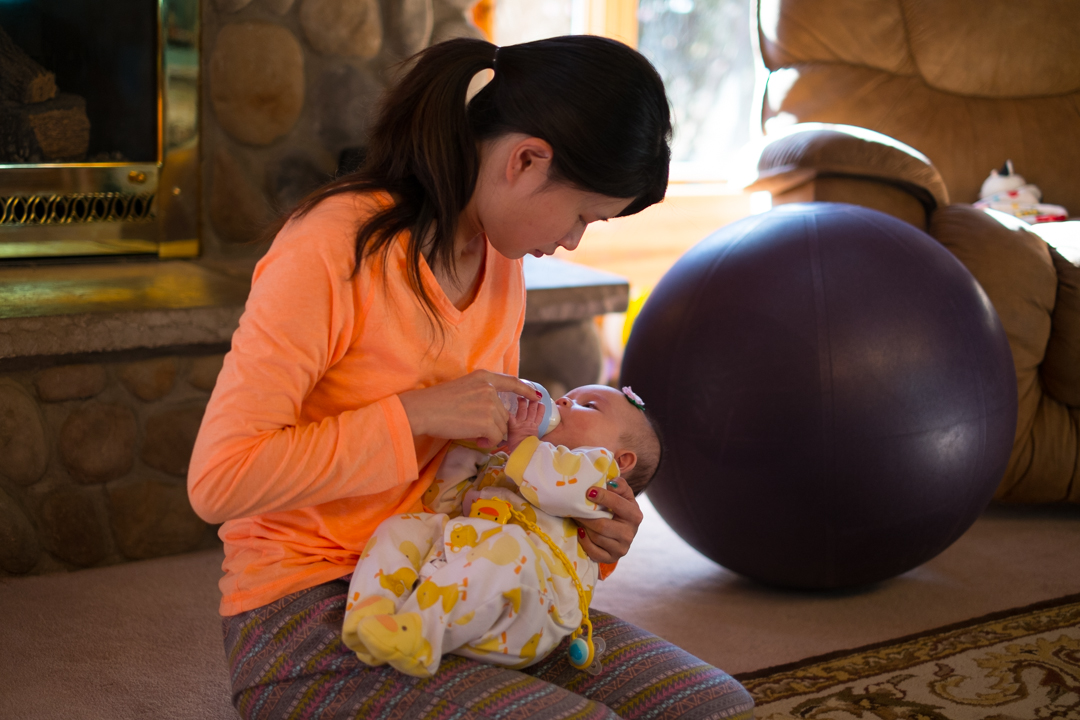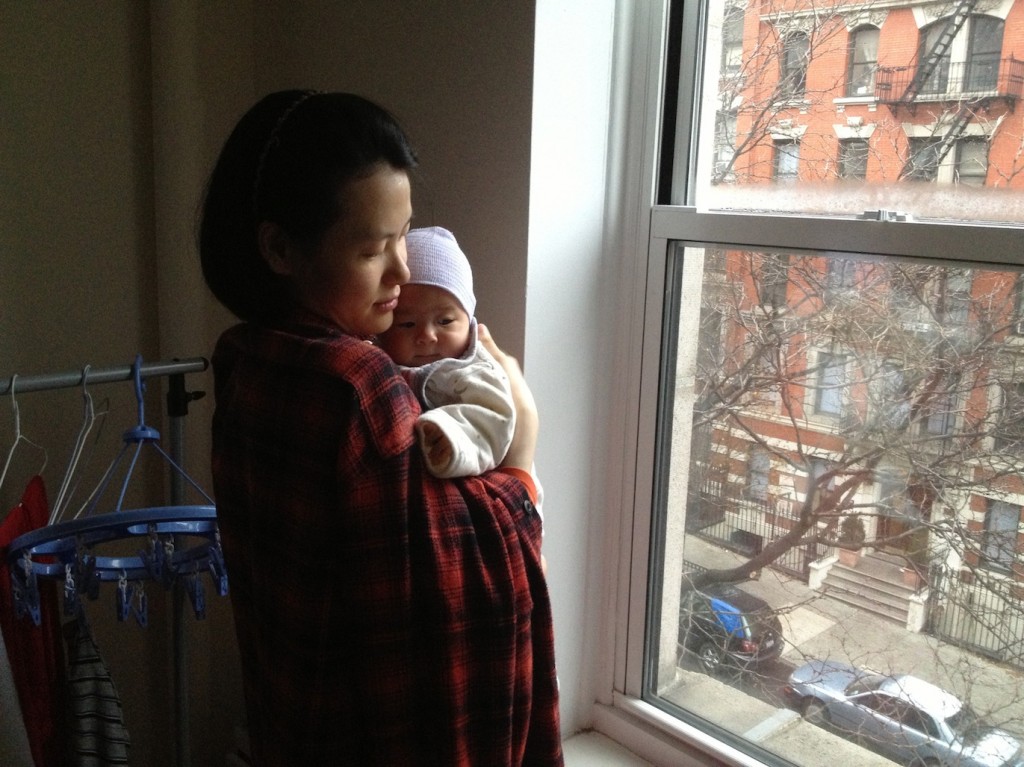No showering, no going outside, no drinking cold water–for an entire month. Many women in mainland China observe these rules as part of a traditional health care practice following childbirth.

March 18, 2014
No showering, no going outside, no drinking cold water–for an entire month. Many women in mainland China observe these rules as part of a traditional health care practice following childbirth called “zuo yue zi” or “sitting the month.”
In New York City, immigrant women continue these traditions with the help of their families. Relatives, normally the women’s mothers, take care of their daughters and the newborn grandchildren. But, sometimes, tensions can arise between mothers and daughters on how to continue this tradition. New grandmother, Ming Tang, admitted to putting a pinch of salt in the protein rich soup she makes for her daughter who recently gave birth, “otherwise it would be difficult for the rest of us to eat” she explained with a smile. And, new mom Adella Cheng, who lives in Corona, Queens, said she didn’t follow many of the traditions: “I did everything that she [her mother] told me not to do. I ate ice cream, I had sushi.”
For women whose mothers or relatives are not close by, new businesses are emerging as an alternative. More than 10 professional postpartum centers currently operate in Flushing and Bayside, Queens; most are run out of the owners’ apartments. Some of these New York City-based facilities are connected to businesses in Mainland China, which have expanded their businesses to diaspora communities around the world. A one-month postpartum recovery program costs about 3,000 to 4,800 dollars, according to one staff member at Junbao Postpartum Care Center in Flushing. The first professional postpartum center of this kind started in Beijing in 2004. The industry began to thrive a few years later and now generates more than 3 billion dollars annually, according to this study from China Market Research Reports, a consulting firm that analyzes the country’s industries and markets. The report found that about 10 percent of new moms in China–the majority of whom are middle-class–hire nurses, but less than one percent join postpartum centers.
TRANSCRIPT
Reporter: Jingyi Xu is holding her baby girl, just 33 days old, in her apartment in Morningside Heights in Manhattan. Since giving birth in late September, she has been wearing a hat and scarf every time she goes out. She doesn’t drink or touch any cold water. And she eats certain food with almost no salt.
This is all part of the traditional Chinese practice of postpartum confinement during the month after childbirth. In Chinese, it’s called “Zuo Yue Zi”, which literally means “sitting the month.”
Jingyi Xu*: I did most of my research online and it says it’s 42 days for natural birth and 56 days for C-section.
Reporter: Sitting the month is all about letting the mother restore her health after childbirth. Traditionally, new moms are not allowed to go outside, shower, eat raw food or drink cold water. But like many educated Chinese women, Xu is adopting a variation on this ancient practice.

Jingyi Xu*: I’m not doing it as strictly as how women in southern China or Taiwan do it, like you can’t bathe or leave the house. But I didn’t take a bath or eat ice cream immediately after childbirth, like most of the American moms would do. My approach is pretty moderate.
Reporter: Xu may have given the practice some modern twists. But she did adopt the diet rules, the cornerstone of sitting the month. Days before the birth, Xu’s mother, Ming Tang, flew in from Shanghai to cook for her daughter.
Tang acquired an herbal soup recipe from Chinatown in Manhattan and cooked it for Xu every day for the first two weeks after she gave birth. The soup, called Sheng Hua Tang, is very popular in China. Many believe it dissolves blood clots. Xu’s mother also cooked soup high in protein and nutrients.
Ming Tang*: I cook a lot of pigs’ feet soup and I also put soybeans in it. It’s very rich and can increase her milk supply. I put a pinch of salt in the soup but she doesn’t know. She told me everything has to be cooked bland. But it’s difficult for the rest of us to eat.
Reporter: The practice of Zuo Yue Zi dates back in literature 2000 years, says Zhicheng Zheng, a doctor in Chinese herbal medicine in Manhattan’s Chinatown.
Zhicheng Zheng: When you give birth to baby, then you naturally you become deficient because you lose a lot of blood and nutrition. They become very susceptible to any kind of infection because their immune system is down.
Reporter: He says, sitting the month comes from the traditional Chinese ideology of balancing the energies between yin and yang, hot and cold.
Zhicheng Zheng: The rule of thumb is that you should avoid cold things otherwise you can easily develop rheumatoid arthritis because when you just give birth to baby all your joints or pores are open, so the cold air easily invade into your bones and body.
Reporter: The tradition of sitting the month is deeply embedded in Chinese culture. But immigration to places like the U.S. tests these cultural ties.
Adella Cheng: Most of it is ridiculous to me. I did my own research. I don’t just listen to random people say things.
Reporter: Adella Cheng is originally from southern China. She moved to the United States 12 years ago and gave birth to her baby girl [laughing and music box] in early September. For her, sitting the month is more like a game of make-believe because she only pretended to be following the rules in front of her mother.
Adella Cheng: I drank only the hot water in front of her. But I drank anything when she’s not around. I did everything that she told me not to do. I ate ice cream, I had sushi. She told me not to eat anything raw because it will give me diarrhea.
Reporter: Did it?
Adella Cheng: No.
Reporter: The way Cheng is sitting the month would seem unusual to many Chinese immigrants. But she does believe bed rest is important for recovery, as western doctors also suggest. Randy Yeh is Chinese and also radiology resident at Columbia University. He says the practice is valid from an Eastern medical standpoint but he wouldn’t recommend a complete confinement.
Randy Yeh: In terms of from a purely western medicine standpoint, sitting the month has no scientifically proven benefits.
Reporter: He says, it’s good for the mother bonding with the child, but it can be isolating. Still, he says it shouldn’t be discounted simply because it has no foundation in Western medicine.
Randy Yeh: I would like to say that you can’t really judge a culture for the things that they believe even though we don’t know the reason behind it.
Reporter: Typically, new moms sit the month at home and receive care from their relatives. But for immigrant women whose families aren’t around, many are turning to postpartum centers in the city. These facilities are often operated as home businesses in Flushing, Queens. For Open City, this is Amanda Hou.
*Interviews translated from Mandarin

